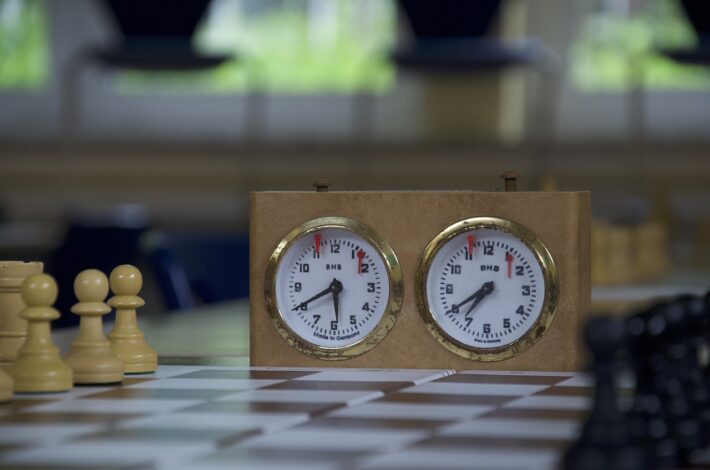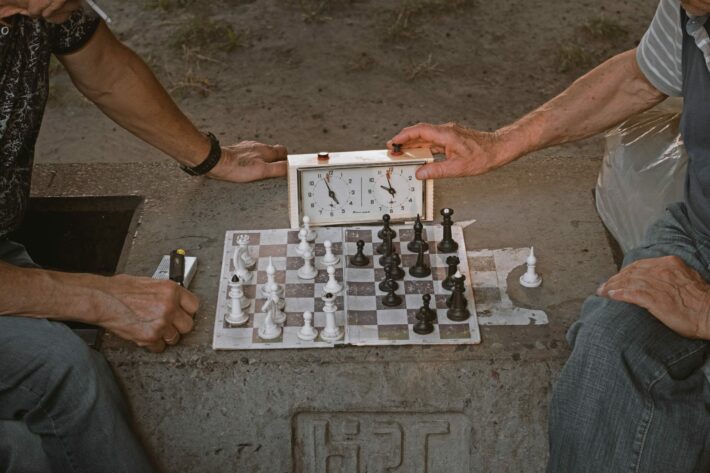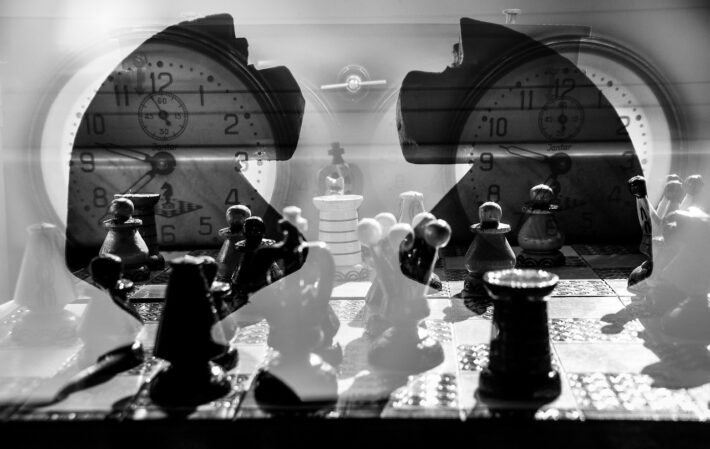Imagine the electrifying atmosphere of a chess match, where strategic moves and intense concentration shape the outcome. Amidst this mental battle, there is a silent yet crucial companion present—the chess timer. This unassuming device holds the power to regulate time, ensure fair play, and add an extra layer of excitement to the game.
In this comprehensive guide, we will delve into the inner workings of a chess timer, exploring its various types, functions, and the impact it has on the world of chess. So, fasten your seatbelts as we embark on a journey to uncover the mysteries behind this intriguing apparatus.
How does a chess timer ensure fair play during matches?
Chess timers play a vital role in maintaining fairness and preventing players from gaining undue advantage. By imposing time limits on each player’s moves, chess timers ensure that neither participant can monopolize the game. With the implementation of specific time control formats, such as Fischer and Bronstein systems, players are given equal opportunities, leading to fair competition.
| Key Features | Description | Benefits |
|---|---|---|
| Dual Timers | Separate timers for each player | Prevents one player from taking advantage of the other |
| Time Controls | Various preset time settings | Allows customization based on the game’s desired time limits |
| Digital Display | Clear and visible time representation | Ensures players can easily track the remaining time |
| Time Increments | Additional time is added after each move | Encourages strategic thinking and prevents time depletion |
| Delay Settings | The time delay before the player’s clock starts | Prevents quick, thoughtless moves and maintains fairness |
| Bonus Time | Additional time earned by capturing | Rewards aggressive and skillful gameplay |
| Flagging System | Indication when the time limit is reached | Alerts players and allows for immediate game result assessment |
What are the different types of chess timers available in the market?

Chess timers come in various forms, catering to the preferences and needs of different players. Analog timers, reminiscent of old-school chess matches, employ physical mechanisms to measure and display time. On the other hand, digital timers have gained popularity due to their accuracy, ease of use, and additional features like time increments and delay settings. Chronos, DGT, and ZMartFun are notable brands offering a wide range of chess timers.
Why is precision crucial in chess timers?
In the game of chess, every second counts, making precision a vital aspect of chess timers. A well-calibrated timer ensures accurate time measurement, preventing discrepancies and disputes. Precision is particularly crucial during intense tournament play, where players rely on timers to make crucial decisions within tight time constraints.
Are analog or digital chess timers better for tournament play?
When it comes to tournament play, the choice between analog and digital chess timers becomes a matter of personal preference. Analog timers evoke a traditional feel and may appeal to players seeking a nostalgic experience. However, digital timers offer advantages like precise time measurement, additional features, and customizable settings, making them a popular choice for competitive chess events.
How does a chess timer handle different time control formats?
Chess tournaments often employ various time control formats, such as Blitz, Rapid, and Classical, each with its own set of time limits. Chess timers are designed to accommodate these formats by allowing players to customize the time settings according to the specific tournament rules. Whether it’s the fast-paced action of Blitz or the more leisurely pace of Classical chess, timers adapt to ensure a seamless playing experience.
What happens when a player runs out of time on a chess timer?
Running out of time on a chess timer has significant consequences in the game. When a player’s time expires, they are considered to have lost the game, regardless of the position on the board. This adds an exciting element of urgency and strategic time management to chess matches, compelling players to think quickly and make efficient moves.
Can chess timers be manipulated or tampered with?

Chess timers are designed to be tamper-proof, ensuring the integrity of the game. They employ advanced technology and robust mechanisms to prevent manipulation. With strict regulations and vigilant tournament organizers, the chances of tampering with chess timers are minimal, ensuring a level playing field for all participants.
How do chess timers contribute to the psychological aspect of the game?
Beyond their functional role, chess timers have a psychological impact on players. The ticking sound, the pressure of limited time, and the constant reminder of impending deadlines add to the mental challenge of the game. Players must manage their time effectively, deal with time pressure, and make critical decisions, all while keeping their emotions in check.
Are there any alternative timekeeping methods used in chess?
There are alternative timekeeping methods that cater to different preferences and situations, offering flexibility and diversity in chess time management. Players can choose the method that best suits their needs and enhances their chess-playing experience.
-
Hourglass chess clocks: These clocks feature two connected hourglass-shaped chambers filled with sand. Each player’s time decreases as the sand flows from one chamber to the other. When one player’s sand runs out, their time is up, and the other player’s chamber begins to empty.
-
Sand timers: Similar to hourglass clocks, sand timers are standalone devices that players can use to keep track of time. They come in various sizes and durations, allowing players to select the appropriate timer for their game.
-
Smartphone applications: With the advancement of technology, chess players now have the option to use dedicated chess timer applications on their smartphones. These apps provide customizable time settings, alerts, and even additional features like motion tracking and game history.
-
Online chess platforms: When playing chess online, dedicated platforms often include built-in timers that automatically regulate each player’s time. These timers ensure fair play and maintain the integrity of the game, even in virtual environments.
-
Chess clocks with digital displays: While not considered alternative methods per se, chess clocks with digital displays offer a modern twist to traditional timekeeping. They provide clear and visible time representation, allowing players to easily track the remaining time.
How have chess timers evolved over the years?
Chess timers have come a long way since their inception, evolving to meet the changing needs of players. From simple mechanical devices to sophisticated digital timers with advanced features, the evolution of chess timers has enhanced the overall chess-playing experience. The integration of technology has opened up new possibilities and paved the way for innovative features like touchscreen displays, wireless connectivity, and compatibility with chess-playing software.
Do chess timers impact the strategy and decision-making of players?
Undoubtedly, chess timers influence the strategic decisions players make during a match. With limited time, players must weigh their options, calculate moves, and make choices swiftly. The time pressure adds a captivating dimension to the game, forcing players to balance speed and accuracy in their moves.
How does a chess timer handle time increments and delays?

Time increments and delays are additional features in modern chess timers that allow players to gain extra time after each move or introduce a delay before the clock starts counting down. Time increments reward thoughtful play, incentivizing strategic thinking and preventing time depletion. Delay settings, on the other hand, discourage hasty moves, ensuring players carefully consider their moves before starting the clock.
Are there any innovative features in modern chess timers?
There are innovative features in modern chess timers that enhance convenience, functionality, and enjoyment for players. They bring a touch of technology and sophistication to the traditional chess timekeeping process, making it more seamless and engaging.
-
Touchscreen displays: Many modern chess timers feature touchscreen displays, offering a user-friendly interface for setting and tracking time. Players can easily adjust time controls, navigate menus, and view the time remaining with a simple touch.
-
Wireless connectivity: Some advanced chess timers come with wireless connectivity options. This feature allows multiple timers to synchronize, making them suitable for team play or simultaneous exhibitions. It ensures accurate time management across multiple boards.
-
Game save options: Certain modern chess timers offer game save functionality, allowing players to pause and resume their matches at a later time. This feature is particularly useful for longer games or tournaments where matches span multiple sessions.
-
Move counters: Integrated move counters in chess timers help players keep track of their moves throughout the game. It enables players to review the game’s progress, analyze their strategy, and make informed decisions based on move counts.
-
Audio alerts: Innovative timers may include audio alerts to signal critical game moments, such as nearing the end of time control or running out of time. These audio cues serve as reminders and add excitement to the game, enhancing the overall playing experience.
Can chess timers be customized for specific tournaments or events?
Chess timers offer customization options, enabling organizers to tailor them to specific tournament requirements. Time control formats, increment, and delay settings, and even unique sounds or visual effects can be programmed to align with the event’s theme or rules. This flexibility allows for a personalized and memorable experience for participants.
What role do chess timers play in online chess games?
In the digital era, online chess platforms have gained immense popularity, bringing players from around the world together. Even in virtual matches, chess timers play a vital role, in ensuring fair play, time management, and maintaining the essence of competitive chess. Online chess platforms integrate virtual timers that function similarly to physical timers, providing an authentic chess experience.
Wrap-up: The Inner Workings of a Chess Timer
Overall, we have explored the fascinating world of chess timers, unearthing their significance, functions, and impact on the game of chess. From ensuring fair play and regulating time to adding excitement and strategic depth, chess timers have become an integral part of the chess experience.
Whether it’s the choice between analog and digital, the management of time control formats, or the psychological aspects they evoke, chess timers continue to captivate players and enhance the competitive nature of the game. So, the next time you engage in a chess match, take a moment to appreciate the silent companion that silently governs the ticking flow of time.




